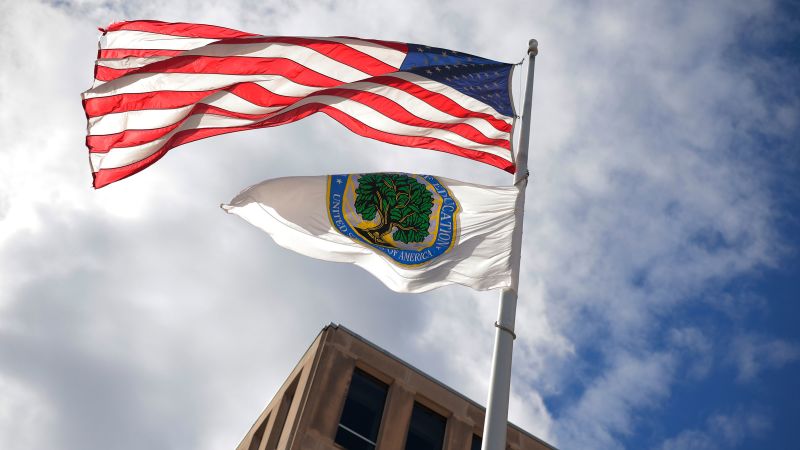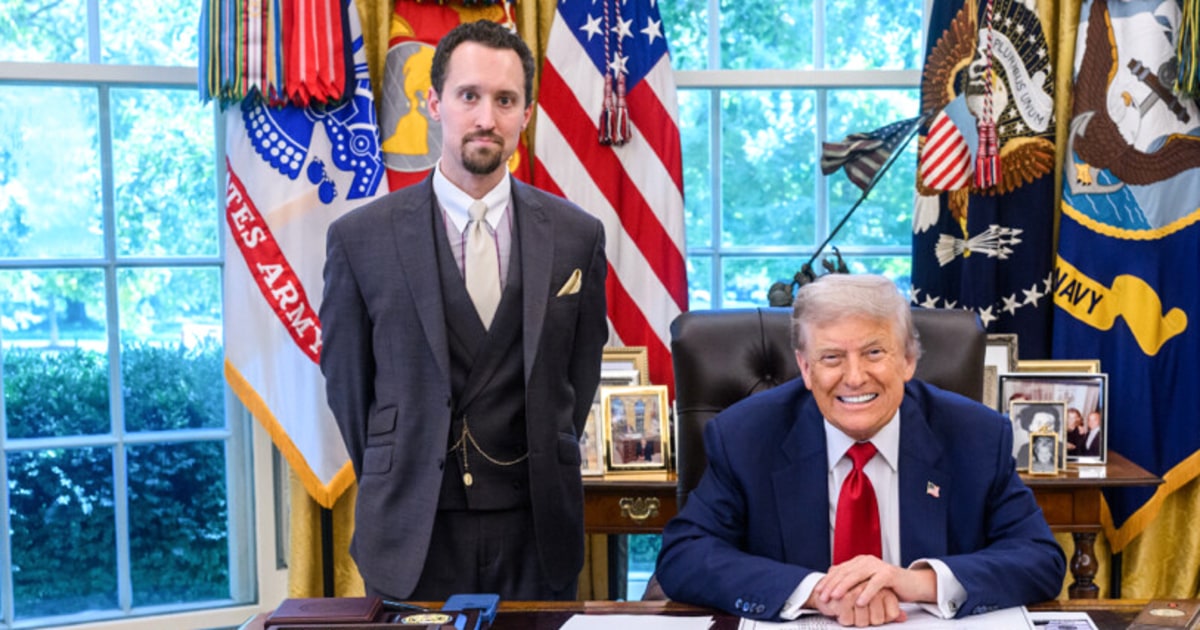Nominee Withdraws from Office of Special Counsel Amid Controversy

Introduction
Paul Ingrassia, a nominee for the Office of Special Counsel, has withdrawn his candidacy due to insufficient Republican support. This decision follows the emergence of controversial text messages, which have sparked widespread criticism and opposition from both parties.
Controversy and Withdrawal
Ingrassia's withdrawal was necessitated by the lack of Republican backing, which became apparent after reports of offensive texts surfaced. These messages included remarks about having a "Nazi streak" and disparaging the Martin Luther King Jr. holiday. Despite his attorney's defense that the messages were satirical, the backlash was severe, leading to opposition from several GOP senators.
Implications
The withdrawal highlights the challenges faced by nominees with controversial pasts. Ingrassia's case underscores the importance of maintaining public trust in government positions, particularly in roles like the Office of Special Counsel, which is crucial for protecting whistleblowers and upholding merit-based civil service principles.
About the People Mentioned
Paul Ingrassia
**Paul Ingrassia (lawyer, b. circa 1990s)** is an American attorney, political commentator, and government official serving as Acting General Counsel of the U.S. General Services Administration (GSA).[2][5] He earned a BA with honors in mathematics and economics from Fordham University, followed by a Juris Doctor from Cornell Law School in 2022, where he served as senior online editor of the *Cornell Journal of Law and Public Policy* and received multiple CALI Excellence Awards.[2][3] Ingrassia's early career blended legal work and conservative media. While in law school, he wrote for outlets like *The Daily Caller*, *National Review*, *Human Events*, and *American Greatness*, and co-hosted the podcast *Right on Point* (2018–2020) with his sister Olivia, promoting ideas from thinkers like William F. Buckley Jr. and Russell Kirk.[2][3] Post-graduation, he worked for the National Constitutional Law Union—a group positioning itself against the ACLU—and at Joseph D. McBride's firm, assisting clients including January 6 Capitol attack defendants and the Tate brothers amid Romanian sex trafficking allegations.[2][3] Admitted to the New York bar in July 2024, his Substack gained notice when President Donald Trump cited it, including a false claim about Nikki Haley's presidential eligibility in January 2024.[2] In 2025, Trump nominated Ingrassia as Special Counsel to lead the U.S. Office of Special Counsel, tasked with whistleblower protection and civil service enforcement, but withdrew it in October amid backlash over leaked texts with alleged racist and pro-Nazi remarks reported by *Politico*.[2][3] The following month, he joined GSA as deputy general counsel, advancing to acting general counsel by December 2025—a role he holds as of early 2026.[2][5] In September 2025, a lawsuit by former FBI officials accused him, on the Trump transition team, of assessing candidates' loyalty to Trump.[3] Previously a Claremont Institute fellow and Trump White House intern, Ingrassia remains a New York Young Republican active in conservative circles.[2] *(Note: A separate Paul Ingrassia, the Pulitzer-winning journalist who died in 2019, is unrelated.)[1][4] (298 words)*
Martin Luther King Jr.
Martin Luther King Jr. (born Michael King Jr., January 15, 1929, Atlanta, Georgia; died April 4, 1968, Memphis, Tennessee) was an American Baptist minister and civil rights leader who spearheaded the U.S. civil rights movement from 1955 until his assassination.[1][2][3] Born to Baptist minister Michael Luther King Sr. and schoolteacher Alberta King, he earned a Ph.D. in systematic theology from Boston University in 1955 after studies at Morehouse College and Crozer Theological Seminary.[1][2] King rose to prominence leading the 1955-1956 Montgomery Bus Boycott, sparked by Rosa Parks' arrest, which mobilized the Black community against segregated public transit and culminated in a U.S. Supreme Court ruling declaring bus segregation unconstitutional.[1][2][5] In 1957, he became the first president of the Southern Christian Leadership Conference (SCLC), an organization promoting nonviolent resistance inspired by Mahatma Gandhi and Christian principles to combat Jim Crow laws, voter suppression, and racial discrimination.[2][4][6] His key achievements include organizing the 1963 Birmingham campaign, which exposed police brutality and produced his seminal "Letter from Birmingham Jail"; the March on Washington, where he delivered the iconic "I Have a Dream" speech to 250,000 people, pressuring passage of the 1964 Civil Rights Act; and the 1965 Selma-to-Montgomery marches, leading to the Voting Rights Act that authorized federal oversight of voter registration and banned literacy tests.[1][3][4][5][7] King received the Nobel Peace Prize in 1964 at age 35, the youngest recipient at the time, for advancing racial equality through nonviolence.[2][3][4] He faced arrests (nearly 30 times), FBI surveillance under COINTELPRO, and bombings, yet expanded his advocacy to poverty and opposition to the Vietnam War.[2][5][6] King was assassinated in Memphis while supporting a sanitation workers' strike.[2][5] His legacy endures in ongoing fights against racial injustice, with Martin Luther King Jr. Day a federal holiday since 1986 symbolizing nonviolent activism's relevance today.[2][3]
About the Organizations Mentioned
Office of Special Counsel
The United States Office of Special Counsel (OSC) is an independent federal agency established on January 1, 1979, with a mission to protect the integrity of the federal workforce and government operations. Originally part of the Merit Systems Protection Board (MSPB), the OSC became a fully independent agency in 1989 following the passage of the Whistleblower Protection Act (WPA), which strengthened its authority to safeguard federal employees from retaliation for reporting wrongdoing. The OSC’s core responsibilities include investigating and prosecuting prohibited personnel practices—such as reprisal for whistleblowing—and enforcing the Hatch Act, which restricts partisan political activity by government employees. It also enforces the Uniformed Services Employment and Reemployment Rights Act (USERRA), ensuring that service members are protected from employment discrimination due to their military service. The agency provides a secure channel for federal employees to disclose violations of law, gross mismanagement, waste of funds, abuse of authority, or threats to public health and safety. Over the years, the OSC has played a pivotal role in promoting transparency and accountability in government. Notable achievements include the recognition of whistleblowers who have exposed critical health and safety concerns, such as those in the mining industry, and the enforcement of rules that prevent political corruption and protect employee rights. The OSC’s annual reports and open government initiatives further demonstrate its commitment to transparency and public engagement. Currently led by a special counsel nominated by the president and confirmed by the Senate, the OSC operates with a budget that accounts for less than 0.1% of total federal spending. Its work is essential for maintaining trust in government institutions and ensuring that federal employees can report misconduct without fear of retaliation. For those interested in business and technology, the OSC’s efforts underscore the importance of ethical governance and the protection of whistleblowers in both public and private sectors.
GOP
The **GOP**, or **Grand Old Party**, is the widely recognized nickname for the **Republican Party** of the United States, a major conservative political party founded in 1854. It originated from anti-slavery activists opposing the Kansas-Nebraska Act, uniting former Whigs and Free Soilers with a platform centered on halting the expansion of slavery. The party's early historic milestone was the election of Abraham Lincoln in 1860, which precipitated the Civil War; under Lincoln’s leadership, the GOP focused on preserving the Union and abolishing slavery[1][2][3]. Throughout its history, the Republican Party has evolved from its abolitionist roots to champion business interests, industrial growth, and economic policies favoring limited government intervention. In the late 19th and early 20th centuries, it promoted protective tariffs and infrastructure development. The party experienced fluctuating influence, losing ground during the New Deal era but regaining prominence with Dwight D. Eisenhower’s presidency in the 1950s, marked by moderate conservatism[1][2]. Today, the GOP advocates for reduced taxes, conservative social policies, limited government regulation, strong national defense, and states’ rights. It remains one of the two dominant forces in American politics, consistently shaping legislative agendas and national discourse[2]. The party is organized and led nationally by the **Republican National Committee (RNC)**, which manages fundraising, election strategies, and the party platform, coordinating efforts across states and counties under the leadership of a chairman[3][4]. Notably, the acronym "GOP" was popularized in the late 19th century and originally stood for "Grand Old Party," symbolizing the party's legacy in preserving the Union and championing liberty. It is now a common term in political commentary and media[3][5]. In recent years, the GOP has undergone significant membership changes in Congress and leadership adjustments, reflecting its dynamic role in U.S. politics as













